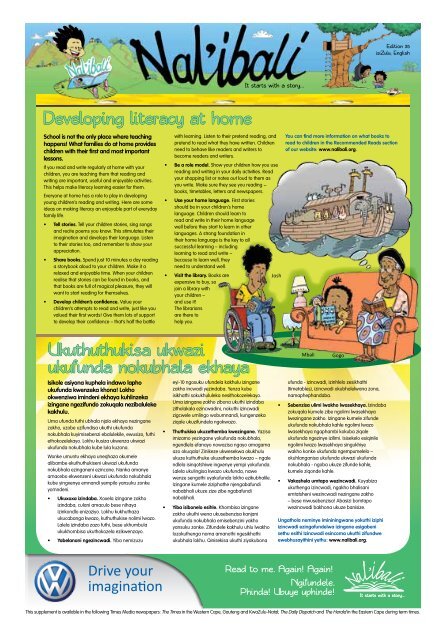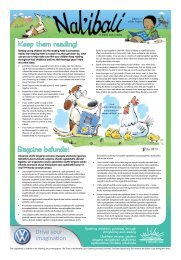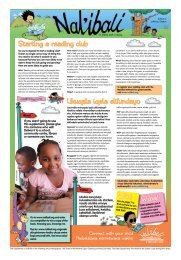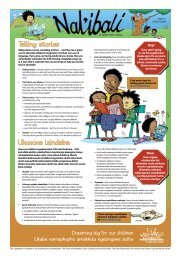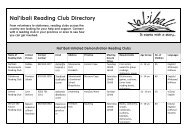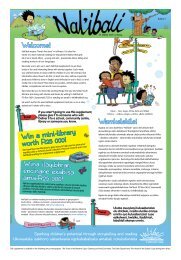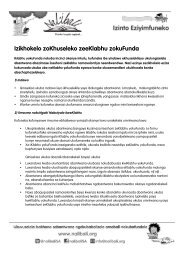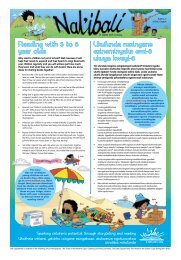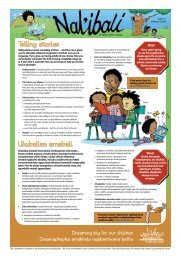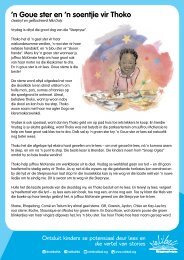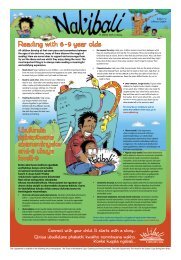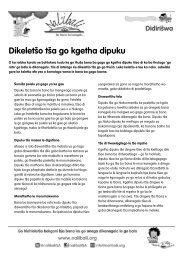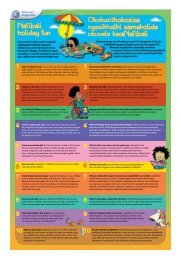You also want an ePaper? Increase the reach of your titles
YUMPU automatically turns print PDFs into web optimized ePapers that Google loves.
Edition 35<br />
isiZulu, English<br />
Developing literacy at home<br />
School is not the only place where teaching<br />
happens! What families do at home provides<br />
children with their first and most important<br />
lessons.<br />
If you read and write regularly at home with <strong>your</strong><br />
children, you are teaching them that reading and<br />
writing are important, useful and enjoyable activities.<br />
This helps make literacy learning easier for them.<br />
Everyone at home has a role to play in developing<br />
young children’s reading and writing. Here are some<br />
ideas on making literacy an enjoyable part of everyday<br />
family life.<br />
• Tell stories. Tell <strong>your</strong> children stories, sing songs<br />
and recite poems you know. This stimulates their<br />
<strong>imagination</strong> and develops their language. Listen<br />
to their stories too, and remember to show <strong>your</strong><br />
appreciation.<br />
• Share books. Spend just 10 minutes a day reading<br />
a storybook aloud to <strong>your</strong> children. Make it a<br />
relaxed and enjoyable time. When <strong>your</strong> children<br />
realise that stories can be found in books, and<br />
that books are full of magical pleasure, they will<br />
want to start reading for themselves.<br />
• Develop children’s confidence. Value <strong>your</strong><br />
children’s attempts to read and write, just like you<br />
valued their first words! Give them lots of support<br />
to develop their confidence – that’s half the battle<br />
with learning. Listen to their pretend reading, and<br />
pretend to read what they have written. Children<br />
need to behave like readers and writers to<br />
become readers and writers.<br />
• Be a role model. Show <strong>your</strong> children how you use<br />
reading and writing in <strong>your</strong> daily activities. Read<br />
<strong>your</strong> shopping list or notes out loud to them as<br />
you write. Make sure they see you reading −<br />
books, timetables, letters and newspapers.<br />
• Use <strong>your</strong> home language. First stories<br />
should be in <strong>your</strong> children’s home<br />
language. Children should learn to<br />
read and write in their home language<br />
well before they start to learn in other<br />
languages. A strong foundation in<br />
their home language is the key to all<br />
successful learning – including<br />
learning to read and write −<br />
because to learn well, they<br />
need to understand well.<br />
• Visit the library. Books are<br />
expensive to buy, so<br />
join a library with<br />
<strong>your</strong> children –<br />
and use it!<br />
The librarians<br />
are there to<br />
help you.<br />
Josh<br />
You can find more information on what books to<br />
read to children in the Recommended Reads section<br />
of our website: www.nalibali.org.<br />
Ukuthuthukisa ukwazi<br />
ukufunda nokubhala ekhaya<br />
Mbali<br />
Gogo<br />
Isikole asiyona kuphela indawo lapho<br />
ukufunda kwenzeka khona! Lokho<br />
okwenziwa imindeni ekhaya kuhlinzeka<br />
izingane ngezifundo zokuqala nezibaluleke<br />
kakhulu.<br />
Uma ufunda futhi ubhala njalo ekhaya nezingane<br />
zakho, uzobe uzifundisa ukuthi ukufunda<br />
nokubhala kuyimisebenzi ebalulekile, ewusizo, futhi<br />
ethokozelekayo. Lokhu kusiza ukwenza ukwazi<br />
ukufunda nokubhala kube lula kuzona.<br />
Wonke umuntu ekhaya uneqhaza okumele<br />
alibambe ekuthuthukiseni ukwazi ukufunda<br />
nokubhala ezinganeni ezincane. Nanka amanye<br />
amacebo ekwenzeni ukwazi ukufunda nokubhala<br />
kube yingxenye emnandi yempilo yansuku zonke<br />
yomndeni.<br />
• Ukuxoxa izindaba. Xoxela izingane zakho<br />
izindaba, culani amaculo bese nihaya<br />
izinkondlo enizaziyo. Lokhu kukhuthaza<br />
ukucabanga kwazo, kuthuthukise nolimi lwazo.<br />
Lalela izindaba zazo futhi, bese ukhumbula<br />
ukukhombisa ukuthokozela ezikwenzayo.<br />
• Yabelanani ngezincwadi. Yiba nemizuzu<br />
eyi-10 ngosuku ufundela kakhulu izingane<br />
zakho incwadi yezindaba. Yenza kube<br />
isikhathi sokukhululeka nesithokozelekayo.<br />
Uma izingane zakho zibona ukuthi izindaba<br />
zitholakala ezincwadini, nokuthi izincwadi<br />
zigcwele umlingo wobumnandi, kungenzeka<br />
ziqale ukuzifundela ngokwazo.<br />
• Thuthukisa ukuzethemba kwezingane. Yazisa<br />
imizamo yezingane yokufunda nokubhala,<br />
ngendlela efanayo nowazisa ngayo amagama<br />
azo okuqala! Zinikeze ukwesekwa okukhulu<br />
ukuze kuthuthuke ukuzethemba kwazo – ngale<br />
ndlela isinqotshiwe ingxenye yempi yokufunda.<br />
Lalela ukulingisa kwazo ukufunda, nawe<br />
wenze sengathi uyakufunda lokho ezikubhalile.<br />
Izingane kumele ziziphathe njengabafundi<br />
nababhali ukuze zize zibe ngabafundi<br />
nababhali.<br />
• Yiba isibonelo esihle. Khombisa izingane<br />
zakho ukuthi wena ukusebenzisa kanjani<br />
ukufunda nokubhala emisebenzini yakho<br />
yansuku zonke. Zifundele kakhulu uhlu lwakho<br />
lozokuthenga noma amanothi ngesikhathi<br />
ukubhala lokhu. Qinisekisa ukuthi ziyakubona<br />
ufunda - izincwadi, izinhlelo zesikhathi<br />
(timetables), izincwadi okubhalelwana zona,<br />
namaphephandaba.<br />
• Sebenzisa ulimi lwakho lwasekhaya. Izindaba<br />
zokuqala kumele zibe ngolimi lwasekhaya<br />
lwezingane zakho. Izingane kumele zifunde<br />
ukufunda nokubhala kahle ngolimi lwazo<br />
lwasekhaya ngaphambi kokuba ziqale<br />
ukufunda ngezinye izilimi. Isisekelo esiqinile<br />
ngolimi lwazo lwasekhaya singukhiye<br />
wakho konke ukufunda ngempumelelo –<br />
okuhlanganisa ukufunda ukwazi ukufunda<br />
nokubhala - ngoba ukuze zifunde kahle,<br />
kumele ziqonde kahle.<br />
• Vakashela umtapo wezincwadi. Kuyabiza<br />
ukuthenga izincwadi, ngakho bhalisani<br />
emtatsheni wezincwadi nezingane zakho<br />
– bese niwusebenzisa! Abasizi bomtapo<br />
wezincwadi bakhona ukuze banisize.<br />
Ungathola neminye imininingwane yokuthi iziphi<br />
izincwadi ezingafundelwa izingane esigabeni<br />
sethu esithi Izincwadi esincoma ukuthi zifundwe<br />
ewebhusayithini yethu: www.nalibali.org.<br />
<strong>Drive</strong> <strong>your</strong><br />
<strong>imagination</strong><br />
Read to me. Again! Again!<br />
Ngifundele.<br />
Phinda! Ubuye uphinde!<br />
This supplement is available in the following Times Media newspapers: The Times in the Western Cape, Gauteng and KwaZulu-Natal; The Daily Dispatch and The Herald in the Eastern Cape during term times.
<strong>Drive</strong> <strong>your</strong><br />
<strong>imagination</strong><br />
Story stars<br />
Sparking a love of reading<br />
Each year in May, book lovers flock to the beautiful Franschhoek<br />
valley in the Western Cape to attend the Franschhoek Literary<br />
Festival (FLF). One of the main aims of the festival is to encourage a<br />
love of reading. There is also a project, called the FLF School Library<br />
Project, which works throughout the year to help develop literacy in<br />
five schools in the Franschhoek community. We chatted to Margie<br />
Cunnaman about this project.<br />
What is the main aim of the FLF School Library Project<br />
We try to spark a love of reading<br />
in children by encouraging them to<br />
read for pleasure.<br />
What is <strong>your</strong> role in the project<br />
I came up with the plan for how<br />
the project would work and now I<br />
manage it. One of the things I did to<br />
get the project off the ground was<br />
to carefully choose 300 new books<br />
for each school that I thought the<br />
children would enjoy reading.<br />
How did you know which books<br />
to choose<br />
I had worked as a librarian in many<br />
different parts of South Africa so I<br />
could draw on my experience of<br />
books and children to help me. I also<br />
knew that we needed some books in the children’s different mother-tongues and<br />
some books in English.<br />
How does the project work<br />
In each of the five schools, every class visits the library for 30 minutes of story time<br />
once a week. Children in Grade 3 and above are allowed to take books home to<br />
share with their families. The library is also open one afternoon a week after school.<br />
Teachers can bring their classes to the library too, to use the library resources.<br />
In which languages do you read to the children and why<br />
We read to the children in their mother-tongue and in English. It’s important to<br />
develop their English, but they also have the right to read and enjoy stories in their<br />
mother-tongue.<br />
How important is access to books for developing literacy in South Africa<br />
Children need books in their hands to grow a love of reading!<br />
Pic: Halden Krog<br />
Abavelele Ezindabeni<br />
Ukokhela uthando lokufunda<br />
Njalo ngonyaka ngoMeyi, abathandi bezincwadi bathutheleka<br />
endaweni enhle esigodini saseFranschhoek eNtshonalanga Kapa<br />
ukuze bethamele iFranschhoek Literacy Festival (FLF). Enye yezinhloso<br />
ezisemqoka zalo mgubho ukugqugquzela uthando lokufunda,<br />
ngakho Iphrojekthi Yomtapo Wezincwadi Wesikole ye-FLF iqhubeka<br />
unyaka wonke ukuze isize ukuthuthukisa ukwazi ukufunda<br />
nokubhala ezikoleni ezinhlanu ezisemphakathini waseFranschhoek.<br />
Sixoxe noMargie Cunnaman ngale phrojekthi.<br />
Margie Cunnaman<br />
Iyini ihloso eyingqikithi yePhrojekthi Yomtapo Wezincwadi<br />
Wesikole ye-FLF<br />
Siyazama ukokhela uthando lokufunda ezinganeni<br />
ngokuzigqugquzela ukuthi zifundele ukuzithokosiza.<br />
Liyini iqhaza olibambile kule phrojekthi<br />
Ngaqhamuka nohlelo lokuthi ingasebenza kanjani iphrojekthi,<br />
manje sengiyiphethe. Enye yezinto engayenza ukuze kuqale<br />
ukusebenza iphrojekthi ukukhetha ngokunakekela izincwadi<br />
ezintsha eziyi-300 zesikole ngasinye engangicabanga ukuthi<br />
izingane zingakuthokozela ukuzifunda.<br />
Wazi kanjani ukuthi yiziphi izincwadi ongazikhetha<br />
Ngangike ngasebenza njengomsizi emitatsheni yezincwadi<br />
ezindaweni eziningi zaseNingizimu Afrika, ngakho ngasusela<br />
kulawo mava ami ngezincwadi nezingane ukuze ngisizakale.<br />
Okunye engangikwazi ukuthi sasidinga ezinye izincwadi<br />
ngezilimi zasekhaya zezingane ezahlukene kanye nezinye<br />
izincwadi ngesiNgisi.<br />
Isebenza kanjani le phrojekthi<br />
Esikoleni ngasinye ezikoleni ezinhlanu, iklasi ngalinye livakashela umtapo wezincwadi<br />
imizuzu engama-30 yesikhathi sezindaba kanye ngesonto. Izingane eziseBangeni<br />
Lesithathu kanye nangaphezulu zivumelekile ukuya nezincwadi emakhaya ukuze<br />
zabelane ngazo nemindeni yazo, kanti umtapo wezincwadi uyavulwa futhi<br />
ngentambama eyodwa ngesonto uma sekuphume isikole. Othisha nabo bangaletha<br />
amaklasi abo emtatsheni wezincwadi, ukuze basebenzise nezinsiza zawo.<br />
Nizifundela ngaziphi izilimi izingane futhi kungani<br />
Sifundela izingane ngolimi lwasekhaya nesiNgisi. Kubalulekile ukuthuthukisa isiNgisi<br />
sazo, kodwa zinelungelo futhi lokufunda nokuthokozela izindaba ngolimi lwazo<br />
lwasekhaya.<br />
Kubaluleke kangakanani ukwazi ukufinyelela ezincwadini ukuze kuthuthukiswe<br />
ukwazi ukufunda nokubhala eNingizimu Afrika<br />
Izingane zidinga ukuba nezincwadi ezandleni ukuze zikhulise uthando lokufunda!<br />
Across the country, individuals and<br />
organisations are finding ways to make<br />
reading and writing part of children’s daily<br />
lives. To say thank you, our featured Story Stars<br />
will receive meal vouchers* courtesy of Wimpy<br />
to enjoy with the children in whose lives they<br />
are making a difference. To nominate a Story<br />
Star, visit www.nalibali.org/story-stars.<br />
* For terms and conditions that apply, go to<br />
www.nalibali.org/story-stars<br />
Ezweni lonke, umuntu ngamuye kanye nabezinhlangano<br />
bathola izindlela zokwenza ukufunda nokubhala kube<br />
yingxenye yempilo yezingane yansuku zonke. Ukuze<br />
sibabonge, Abavelele Ezindabeni okubhalwe ngabo<br />
bazothola amavawusha okudla ngezilokotho ezinhle<br />
zakwaWimpy ukuze bawathokozele nezingane abenza<br />
umehluko ezimpilweni zazo. Ukuze uqoke ovelele<br />
endabeni, vakashela ku-www.nalibali.org/story-stars.<br />
* Ukuze uthole imigomo nemibandela esebenzayo, iya kuwww.nalibali.org/story-stars<br />
Create <strong>your</strong> own mini-book<br />
1. Take out pages 3 to 6 of<br />
this supplement.<br />
2. Fold it in half along the black<br />
dotted line.<br />
3. Fold it in half again.<br />
4. Cut along the red dotted lines.<br />
Zakhele ibhukwana lakho<br />
1. Khipha ikhasi 3 ukuya ku-6 kulesi<br />
sithasiselo.<br />
2. Lisonge libe nguhhafu lapho kunomugqa<br />
(ulayini) wamachashaza amnyama khona.<br />
3. Lisonge libe nguhhafu futhi.<br />
4. Sika lapho kunomugqa wamachashaza<br />
abomvu khona.<br />
2
8<br />
Fold<br />
9<br />
This is an adapted version of What are you doing, published<br />
by Jacana Media and available in bookstores and on-line from<br />
www.jacana.co.za. This story is also available in isiZulu, isiXhosa,<br />
Afrikaans, Siswati, Sepedi, Sesotho, Setswana, Xitsonga,<br />
Tshivenda and isiNdebele. Jacana publishes books for young<br />
readers in all eleven official South African languages. To find out<br />
more about Jacana titles go to www.jacana.co.za.<br />
Funda indaba yokuqala, Wenzani, eyashicilelwa ngabakwa-<br />
Jacana Media kanti itholakala ezitolo zamabhuku kanye nakuinthanethi<br />
ekhelini elithi: www.jacana.co.za.<br />
Le ndaba iyatholakala futhi ngesiNgisi, isiXhosa, isiBhunu,<br />
iSiswati, isiPedi, isiSotho, isiTswana, isiTsonga, isiVenda<br />
nesiNdebele. Abakwa-Jacana bashicilela amabhuku abafundi<br />
abasha ngazo zonke izilimi ezisemthethweni zaseNingizimu<br />
Afrika. Ukuthola ulwazi ngezihloko ze-Jacana ngena<br />
ku: www.jacana.co.za.<br />
© Jacana Media (South African rights only) Tel: (011 628 3200)<br />
Nal’ibali is a national reading-for-enjoyment campaign<br />
to get people in South Africa – children and adults<br />
– passionate about telling and reading stories.<br />
For more information, visit www.nalibali.org<br />
<strong>Drive</strong> <strong>your</strong><br />
<strong>imagination</strong><br />
UNal’ibali umkhankaso wokufundela<br />
ukuzithokozisa kazwelonke wokokhela<br />
lokho okungenziwa yizingane ngokuxoxa<br />
nangokufunda izindaba. Ukuze uthole eminye<br />
imininingwane, vakashela ku-www.nalibali.org<br />
noma ku-www.nalibali.mobi<br />
Fold<br />
3
10<br />
Fold<br />
7<br />
2<br />
Fold 4<br />
15
6<br />
Fold<br />
11<br />
14<br />
Fold<br />
5<br />
3
12<br />
Fold<br />
5<br />
4<br />
Fold<br />
6<br />
13
Get story<br />
active!<br />
After you and <strong>your</strong> children have read What are you<br />
doing, try out some of these ideas.<br />
• Together look at the pictures again. Talk about<br />
the ways in which Lele’s family uses reading and<br />
writing. What kinds of things do you use reading<br />
and writing for in <strong>your</strong> home<br />
• Read the story again, looking at the pictures closely. Stop to talk about<br />
the story as you read. For example:<br />
- Pages 4 and 5: What is Aunt Josie reading<br />
- Pages 6 and 7: What do you think Grandpa’s book is about<br />
- Pages 8 and 9: Can you tell what the time is<br />
- Pages 10 and 11: What are they having for supper Where is Lele<br />
- Page 15: What do you think Lele might be writing about<br />
What kind of things do you like to write about<br />
• Let <strong>your</strong> children follow the instructions below to make their own book<br />
about how they and/or family members use reading and writing in<br />
their daily lives. Encourage children to write on their own – even if they<br />
make mistakes. Sometimes younger children like to draw the pictures<br />
and have you write down what they say. Let <strong>your</strong> children read their<br />
completed books to each other and to you!<br />
Yenza indaba<br />
ihlabe umxhwele!<br />
<strong>Drive</strong> <strong>your</strong><br />
<strong>imagination</strong><br />
Ngemuva kokuba wena kanye nezingane zakho senifunde uWenzani,<br />
zamani eminye yale miqondo.<br />
• Bhekani izithombe nindawonye futhi. Khulumani ngezindlela umndeni<br />
kaLele okusebenzisa ngayo ukufunda nokubhala. Yiziphi izinhlobo zezinto<br />
enizisebenzisela ukufunda nokubhala ekhaya lakho<br />
• Fundani indaba futhi, nibhekisise izithombe. Yimani ukuze nikhulume ngendaba<br />
ngesikhathi nifunda. Isibonelo:<br />
- Ekhasini lesi- 4 nelesi-5: Ufundani u-Anti uJosie<br />
- Ekhasini lesi- 6 nelesi-7: Ngabe ucabanga ukuthi imayelana nani<br />
incwadi kaMkhulu<br />
- Ekhasini lesi- 8 nelesi-9: Ngabe ungasho ukuthi isikhathi sini<br />
- Ekhasini lesi- 10 nele-11: Badlani esidlweni sakusihlwa Ukuphi uLele<br />
- Ekhasini le-15: Ngabe ucabanga ukuthi uLele ubhala ngani Zinhlobo zini<br />
zezinto wena othanda ukubhala ngazo<br />
• Vumela izingane ukuthi zilandele imiyalelo engezansi ukuze zenze izincwadi zazo<br />
ezimayelana nokuthi zona noma amalungu omndeni akusebenzisa kanjani ukufunda<br />
nokubhala ezimpilweni zawo zansuku zonke. Gqugquzela izingane ukuthi zizibhalele<br />
– noma ngabe zenza amaphutha. Ngesinye isikhathi izingane zithanda ukudweba<br />
izithombe bese wena kumele ukuba ubhale lokho ezikushoyo. Vumela izingane zakho<br />
ukuthi zifundelane zodwa bese zifundela nawe izincwadi zazo eziphelele!<br />
Make <strong>your</strong> own book<br />
Use the blank book on page 8 and create <strong>your</strong> own book to<br />
share with others!<br />
1. Fold the page in half along the red dotted line.<br />
2. Paste the two halves together.<br />
3. Fold the strip of paper along the black lines to create a<br />
zigzag book.<br />
4. Think about the ways you and/or friends or<br />
family members use reading and writing.<br />
Draw pictures and write about this on<br />
pages 2 to 8 of <strong>your</strong> book.<br />
Bella<br />
5. Think about a good title for <strong>your</strong> book<br />
and write this on page 1. Draw<br />
a picture too. Remember to<br />
write the author’s name –<br />
that’s you!<br />
Zenzele ibhukwana lakho<br />
Sebenzisa ibhuku elingabhalwe lutho elisekhasini lesi-8 bese uzakhela<br />
elakho ibhukwana ozokwabelana ngalo nabanye!<br />
1. Goqa ikhasi libe uhhafu ulandele umugqa wamachashaza abomvu.<br />
2. Namathisela uhlanganise lezi zingxenye ezimbili ndawonye.<br />
3. Goqa umucu wephepha ulandele amachashaza amnyama ukuze<br />
wenze incwadi emazombezombe.<br />
4. Cabanga ngezindlela wena kanye<br />
noma nabangani noma amalungu<br />
omndeni abasebenzisa ngayo ukufunda<br />
nokubhala. Dweba izithombe bese<br />
ubhala ngalokhu ekhasini lesi-2 ukuya<br />
kwelesi-8 ebhukwaneni lakho.<br />
5. Cabanga ngesihloko esihle sencwadi<br />
yakho bese ubhala lokhu ekhasini<br />
loku-1. Dweba nesithombe futhi.<br />
Khumbula ukubhala igama lombhali –<br />
uwena lowo!<br />
Noodle<br />
Neo<br />
In <strong>your</strong> next Nal’ibali<br />
supplement:<br />
• Getting and keeping children<br />
motivated to read<br />
• Story Star: Inspirational reading<br />
club volunteer, Faith Shabangu<br />
• Ideas for <strong>your</strong> reading club<br />
• Mini-book, Sonny Jim and his sister<br />
• A zigzag book, Clever Busy Bee<br />
Can’t wait until next week for more reading and<br />
story tips, stories and inspirational ideas<br />
Visit www.nalibali.org or find us on<br />
Facebook: nalibaliSA<br />
Find us<br />
on <strong>your</strong><br />
cellphone:<br />
www.nalibali.mobi<br />
Sithole<br />
kumakhalekhukhwini<br />
wakho:<br />
www.nalibali.mobi<br />
Esithasiselweni sakho<br />
esilandelayo sakwa<strong>Nal'ibali</strong>:<br />
• Ukukhuthaza nokugcina izingane zinomdlandla wokufunda<br />
• Abavelele Ezindabeni: Ivolontiya lethimba lokufunda elinika<br />
ugqozi, uFaith Shabangu<br />
• Amacebo ethimba lakho lokufunda<br />
• Ibhukwana, uSonny Jim nodadewabo<br />
• Incwadi emazombezombe, Inyosi Ehlakaniphile Nematasatasa<br />
Ngabe awukwazi ukulinda kuze kube ngesonto elizayo ukuze ufunde<br />
nokunye kanye namathiphu endaba, izindaba kanye nemiqondo<br />
evusa usinga Vakashela ku-www.nalibali.org noma usithole<br />
ku-Facebook: nalibaliSA<br />
Supplement produced by The Project for the Study of Alternative Education in South Africa (PRAESA) and Times Media Education. Translated by Busisiwe Pakade. Nal’ibali character illustrations by Rico.<br />
7
5<br />
1<br />
2<br />
3<br />
6<br />
7<br />
8<br />
4<br />
<strong>Drive</strong> <strong>your</strong><br />
<strong>imagination</strong><br />
8


